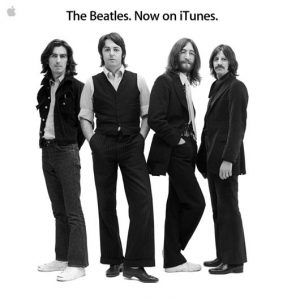In 1964, “The Beatles”, an up and coming British rock band stormed the coasts of the United States and took over the hearts of listeners throughout the country. From 1963-1970, the Beatles would achieve exponential success in a time period that would be remembered as “Beatlemania”. The fame of the Beatles grew so swiftly that during the late 1960’s, lead singer John Lennon was quoted as saying that the Beatles were “more popular than Jesus now.” This comment would lead to protest of the popular group, which was as common to Lennon and the Beatles as sold out shows. The Beatles were undeniably different from any other American band at the time, with long hair, unparalleled charm, and thought provoking way of life.
In 2001, long after Beatlemania, iTunes was establishing itself as the eminent leader of the digital music age. Paired with the groundbreaking iPod, iTunes became immensely popular within a year of its initial release. As a legal platform for Internet music downloading, most musicians signed on to have their music available on iTunes, especially during a period of poor CD sales and Internet piracy. However, many internationally revered groups such as “The Beatles”, and “Led Zeppelin”, remained unavailable to listeners on iTunes.
After Led Zeppelin made their works available for digital purchase on iTunes in November of 2007, many believed it would be a matter of time before The Beatles would sign off their musical rights to a digital music store. Now, on the verge of 2011, nearly 50 years after Beatlemania, the iconic rock and roll band has finally made their music available to the masses via iTunes. Easily the most significant acquisition of rights in the last six years, Apple has marketed the arrival of this classic material to be truly historic and unforgettable.
Despite the historical significance of this arrival, one cannot help but wonder if Paul McCartney and Ringo Starr, the remaining living members of the Beatles, have arrived too late and thus forth missed the “gravy train” that is digital sales. In a world where piracy is arguably more prominent than digital purchase, one would assume that most Beatles fans have already acquired their timeless classics one way or another. Sure, the Beatles have sold an abnormally high amount of singles, but then again, they have released their entire collection at once, while others have outsold them with the release of one single. This could have been avoided with the digital release of the Beatles music in 2004, when the iTunes store began to flourish.
To the devoted Beatles fan, November 16 2010 is certainly a historic date in the digital music world, but for others, this date lacks the significance to live up to Apple’s endless ad campaign. Those who lack interest in the Beatles wonder, “Why Now?” After a decade of refusal, why have the Beatles finally decided to convert to the modern way of sales? No matter how one feels about the timing of this decision, it is certain that the staying power of the Beatles does not go unnoticed. Albums that rocked the world during the turbulent 1960’s are now truly taking over the digital world. It is as if the British invasion is once again unfolding infront of the eyes of the modern generation.









